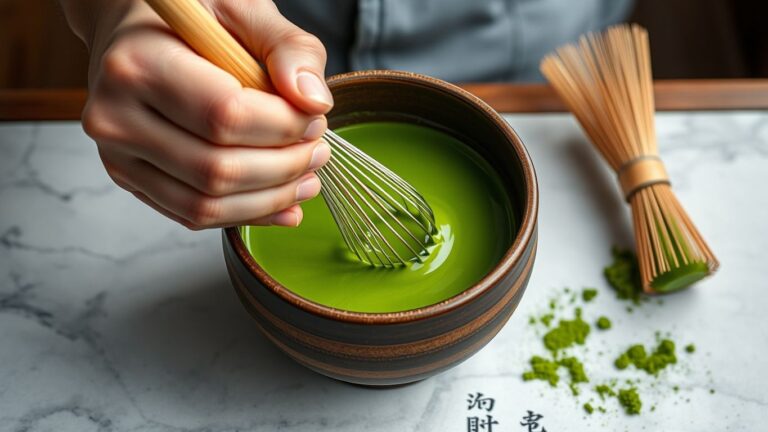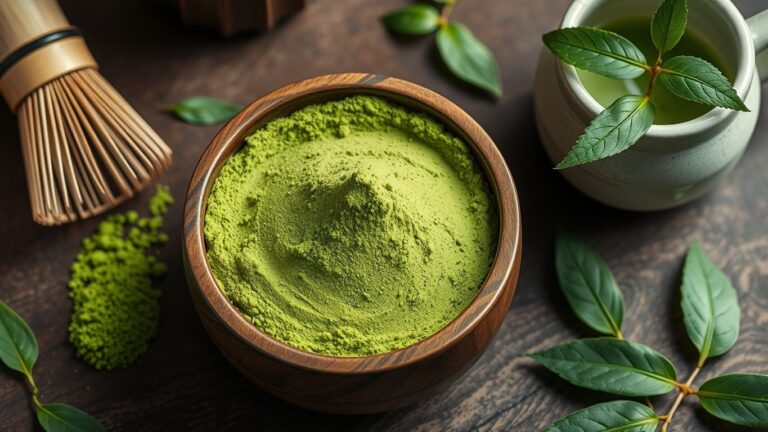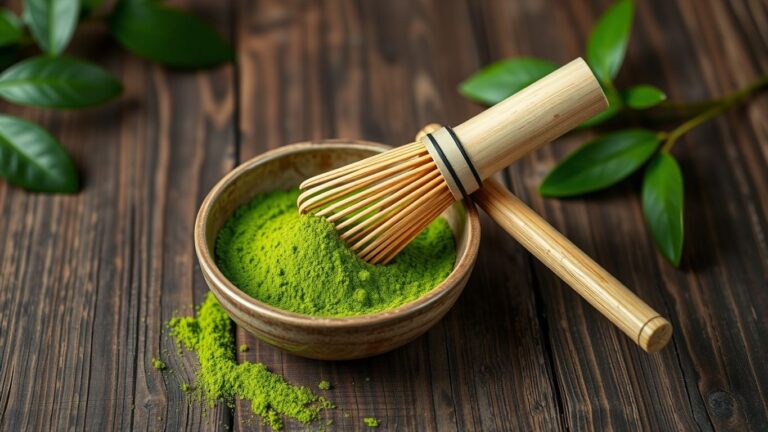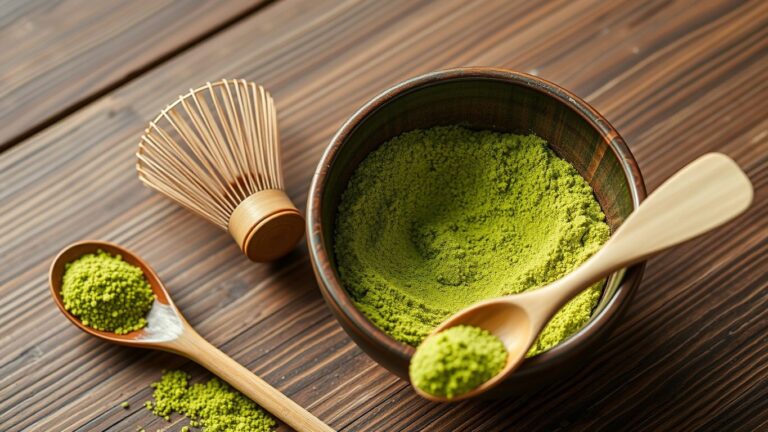Matcha, a fine green tea powder, is popular among people for its health perks. But what about our furry friends? Is matcha safe for dogs, and should you consider giving it to them? This article dives into the details you need to know.
Key Takeaways
- Matcha contains caffeine, which is harmful to dogs even in small amounts.
- Veterinarians generally advise against giving matcha to dogs due to potential health risks.
- Symptoms of caffeine toxicity in dogs include hyperactivity, increased heart rate, and seizures.
- While matcha has antioxidants, the risks outweigh the benefits for dogs.
- There are safer alternatives like decaffeinated or herbal teas for dogs.
Understanding Matcha and Its Components
What is Matcha?
Matcha is a special type of green tea from Japan. Unlike regular green tea, which is brewed from loose leaves, matcha is made by whisking stone-ground green tea powder into hot water. This means you consume the entire leaf, not just an infusion. Matcha is known for its vibrant green color and unique taste.
Nutritional Profile of Matcha
Matcha is packed with nutrients. Here’s a quick look at what you get in a single serving:
| Nutrient | Amount per Serving |
|---|---|
| Caffeine | 70 mg |
| Antioxidants | High |
| Fiber | 1.5 g |
| Vitamin C | 6 mg |
| Vitamin A | 300 IU |
The high levels of antioxidants and vitamins make matcha a popular choice for health enthusiasts.
How Matcha is Made
The process of making matcha is quite fascinating. It starts with growing the tea plants in the shade for about three weeks before harvest. This increases the chlorophyll content, giving matcha its bright green color. After harvesting, the leaves are steamed, dried, and then stone-ground into a fine powder. This traditional method ensures that the tea retains its nutritional benefits and distinct flavor.
Matcha is a version of green tea, so many of its benefits are the same. However, matcha tea has more caffeine than other green teas.
Can Dogs Have Matcha?

Caffeine Content in Matcha
Matcha is a type of green tea that is rich in antioxidants and other nutrients. However, it also contains caffeine, which can be harmful to dogs. Dogs are more sensitive to caffeine than humans, and even small amounts can cause issues like hyperactivity, increased heart rate, and high blood pressure. The caffeine content in matcha is generally higher than in regular green tea, making it a potential risk for your furry friend.
Veterinary Opinions on Matcha for Dogs
Most veterinarians advise against giving matcha to dogs due to its caffeine content. While some believe that small amounts might not cause immediate harm, the risks often outweigh the benefits. It’s always best to consult your vet before introducing any new food or drink into your dog’s diet.
Potential Risks of Matcha for Dogs
The primary concern with matcha for dogs is caffeine toxicity. Symptoms of caffeine toxicity include restlessness, vomiting, diarrhea, and in severe cases, seizures. Long-term exposure to caffeine can also lead to more serious health issues. Therefore, it’s crucial to keep matcha and other caffeinated products out of your dog’s reach.
Health Benefits of Matcha for Dogs
Antioxidant Properties
Matcha is packed with antioxidants like catechins and EGCG. These compounds help neutralize harmful free radicals in your dog’s body, supporting overall cellular health. Antioxidants are crucial for maintaining a healthy immune system and can even help reduce the risk of certain diseases.
Anti-Inflammatory Effects
The EGCG in matcha has been studied for its anti-inflammatory properties. This can be particularly beneficial for dogs with inflammatory conditions. Reducing inflammation can help alleviate pain and improve your dog’s quality of life.
Potential Benefits for Skin and Coat
Matcha’s rich antioxidant content can also benefit your dog’s skin and coat. Antioxidants help maintain healthy skin by reducing oxidative stress, which can lead to a shinier, healthier coat. If your dog has skin issues, incorporating antioxidants into their diet might offer some relief.
While matcha has some potential benefits, it’s important to remember that the caffeine content can pose risks. Always consult your veterinarian before introducing new foods into your dog’s diet.
Risks of Caffeine in Matcha for Dogs
Symptoms of Caffeine Toxicity
Caffeine is a stimulant that can be harmful to dogs. Even small amounts can cause issues. Symptoms of caffeine toxicity in dogs include:
- Restlessness
- Increased heart rate
- Vomiting
- Diarrhea
- Tremors
- Seizures
If your dog shows any of these signs after consuming matcha, it’s crucial to seek veterinary help immediately.
Long-term Health Risks
Long-term exposure to caffeine can lead to serious health problems in dogs. Chronic caffeine ingestion can cause heart issues, high blood pressure, and even damage to the nervous system. It’s best to keep matcha and other caffeinated products away from your pets.
Emergency Measures if Ingested
If your dog accidentally ingests matcha, take these steps:
- Stay calm and assess the situation.
- Remove any remaining matcha from your dog’s reach.
- Contact your veterinarian for advice.
- Follow any instructions given by the vet, which may include inducing vomiting or bringing your dog in for an examination.
Remember, caffeine is toxic to dogs in high enough doses. Because animals are more sensitive to caffeine than humans, even a small amount can be dangerous.
By being aware of the risks and taking prompt action, you can help ensure your dog’s safety.
Matcha and Dental Health in Dogs
Effects of Tannins on Teeth
Matcha contains small amounts of tannins, which can cause staining on both human and animal teeth. Although dogs are less prone to dental issues like cavities compared to humans, prolonged exposure to acidic or staining substances can still negatively impact their dental health. It’s important to monitor your dog’s teeth if they consume matcha.
Fluoride Content in Matcha
Matcha naturally contains fluoride, a mineral often added to tap water and oral care products because of its beneficial effects on dental health. Fluoride helps strengthen tooth enamel, making it more resistant to decay caused by acids and bacteria. However, excessive consumption of fluoride can lead to a condition called fluorosis, which can affect tooth and bone health. Therefore, it’s crucial to avoid giving your dog large amounts of matcha or any other fluoride-containing substances.
Preventing Dental Issues
To prevent dental issues in dogs, consider the following steps:
- Limit matcha consumption: Keep matcha and other caffeinated products away from your dog.
- Regular dental check-ups: Schedule regular dental check-ups with your veterinarian.
- Dental hygiene: Brush your dog’s teeth regularly using dog-friendly toothpaste.
- Provide dental chews: Offer dental chews designed to help clean your dog’s teeth and gums.
Remember, while matcha may have some benefits, it’s essential to weigh these against the potential risks to your dog’s dental health.
Safe Alternatives to Matcha for Dogs
Decaffeinated Teas
If you’re looking for a tea-like treat for your dog, decaffeinated teas are a great option. These teas have the flavor without the caffeine, making them safer for your furry friend. Always ensure the tea is plain and free from any added flavors or sweeteners.
Herbal Teas
Herbal teas can be another safe alternative. Chamomile and peppermint teas are known for their calming effects and can be beneficial for dogs. For instance, chamomile is often found in products like pet honesty calming melatonin for dogs – natural dog anxiety relief with chamomile + l-theanine. Just make sure the tea doesn’t contain any harmful ingredients like caffeine or certain herbs that are toxic to dogs.
Other Safe Treats
There are plenty of other treats that can be both tasty and safe for your dog. Consider fruits like apples (without seeds) or vegetables like carrots. You can also find specially formulated dog treats that are designed to be both delicious and nutritious.
When choosing treats for your dog, always prioritize their health and safety. Consult your vet if you’re unsure about any new additions to their diet.
How Much Matcha is Too Much?
Safe Dosage Guidelines
When it comes to giving your dog matcha, less is more. Matcha contains caffeine, which can be harmful to dogs in large amounts. A general rule of thumb is to avoid giving your dog more than a small pinch of matcha powder. For a dog weighing over 20 pounds, a gram of matcha or a cup of prepared matcha might be safe, but it’s best to consult your vet first.
Signs of Overconsumption
If your dog consumes too much matcha, you might notice some worrying signs. These can include:
- Vomiting and gagging
- Hyperactivity and restlessness
- Increased heart rate
- Elevated blood pressure
- Trouble walking straight
- Seizures
Consulting Your Veterinarian
Before introducing any new food or drink into your dog’s diet, it’s crucial to talk to your vet. They can provide personalized advice based on your dog’s health and weight. Remember, many studies use a dosage of between two and four grams of matcha per day for humans, but dogs are much more sensitive to caffeine.
Always err on the side of caution and keep matcha out of your dog’s reach to prevent accidental ingestion.
Accidental Ingestion of Matcha
Immediate Steps to Take
If your dog accidentally consumes matcha, it’s crucial to act quickly. First, try to determine how much matcha your dog ingested. This can help your vet assess the situation better. If your dog ate an entire bar of matcha chocolate or drank a significant amount of matcha tea, you should contact your vet immediately.
When to Visit the Vet
You should visit the vet if your dog shows any signs of caffeine toxicity. Symptoms include hyperactivity, vomiting, elevated heart rate, and seizures. Even if your dog seems fine, it’s always better to be safe and consult your vet.
Preventing Future Incidents
To prevent future incidents, keep matcha and other caffeinated products out of your dog’s reach. Store these items in high cabinets or locked drawers. Additionally, educate family members about the dangers of matcha for dogs to ensure everyone is vigilant.
Homemade Dog Treats Without Matcha

Healthy Ingredients to Use
Creating homemade dog treats is a fun and rewarding way to ensure your furry friend gets the best nutrition. Here are some healthy ingredients you can use:
- Lean meats like chicken or turkey
- Wholesome grains such as brown rice or oats
- Fresh vegetables like carrots, peas, and sweet potatoes
- Fruits like apples and blueberries (make sure to remove seeds and cores)
- Eggs and tender herbs for added flavor and nutrition
Simple Recipes
Making dog treats at home doesn’t have to be complicated. Here are a couple of easy recipes to get you started:
- Peanut Butter and Banana Biscuits
- Chicken and Rice Balls
Benefits of Homemade Treats
Homemade dog treats offer several benefits:
- Control over ingredients: You know exactly what goes into each treat, ensuring there are no harmful additives.
- Customization: Tailor the treats to your dog’s specific dietary needs and preferences.
- Freshness: Homemade treats are free from preservatives and are often fresher than store-bought options.
Making your own dog treats can be a great way to bond with your pet and ensure they are eating healthy, nutritious snacks. Plus, it’s a fun activity that can be enjoyed by the whole family.
By using simple, wholesome ingredients, you can create delicious and nutritious treats that your dog will love. So, roll up your sleeves and get baking!
Behavioral Effects of Matcha on Dogs

Impact on Hyperactivity
Matcha contains l-theanine, an amino acid known for its calming effects. This can help reduce hyperactivity in dogs, making them more relaxed and easier to manage. However, the caffeine in matcha can counteract these benefits, potentially leading to increased hyperactivity if consumed in large amounts.
Effects on Anxiety
L-theanine in matcha may also help alleviate anxiety in dogs. It works by boosting serotonin and dopamine levels, which are chemicals in the brain that help regulate mood. If your dog is prone to anxiety, a small amount of matcha might help them feel more at ease.
Long-term Behavioral Changes
While matcha can offer some short-term benefits, it’s important to consider the long-term effects. Regular consumption of caffeine can lead to dependency and other health issues. Always consult your veterinarian before adding matcha to your dog’s diet to ensure it’s safe for them.
Matcha can have both positive and negative effects on your dog’s behavior. It’s crucial to weigh these factors carefully.
Consulting Your Veterinarian

When it comes to your dog’s health, consulting your veterinarian is crucial. They can provide personalized advice based on your dog’s specific needs and health status. Always seek professional guidance before introducing new foods or supplements, like matcha, into your dog’s diet.
Conclusion
In summary, while matcha offers numerous health benefits for humans, it’s not a safe treat for our furry friends. The caffeine content in matcha can be harmful to dogs, leading to symptoms like restlessness, increased heart rate, and even seizures. Although small accidental amounts might not cause severe harm, it’s best to avoid giving matcha to your dog altogether. Instead, stick to dog-friendly treats and always consult your vet if you’re unsure about what’s safe for your pet. So, enjoy your matcha latte, but keep it out of your dog’s reach!
Frequently Asked Questions
What is matcha?
Matcha is a type of green tea that comes in powdered form. It’s made from the leaves of the Camellia sinensis plant and is known for its high antioxidant content and health benefits for humans.
Can dogs have matcha?
It’s best to avoid giving matcha to dogs. Matcha contains caffeine, which can be harmful to dogs even in small amounts. Always consult with a veterinarian before introducing new foods to your pet’s diet.
What are the symptoms of caffeine toxicity in dogs?
Symptoms of caffeine toxicity in dogs include restlessness, increased heart rate, vomiting, diarrhea, tremors, and in severe cases, seizures. If you suspect your dog has ingested caffeine, contact your vet immediately.
Are there any benefits of matcha for dogs?
While matcha does have antioxidants and anti-inflammatory properties, the risks due to its caffeine content outweigh the potential benefits for dogs. It’s safer to provide these benefits through other means.
What should I do if my dog accidentally ingests matcha?
If your dog accidentally ingests matcha, monitor them for any signs of caffeine toxicity such as restlessness or vomiting. Contact your veterinarian immediately for advice and potential treatment.
Are there safe alternatives to matcha for dogs?
Yes, there are safer alternatives like decaffeinated teas and herbal teas, which are generally caffeine-free. Always consult your vet before giving your dog any new type of food or drink.
How much matcha is too much for dogs?
Any amount of matcha can be too much due to its caffeine content. Even small amounts can be harmful. It’s best to avoid giving matcha to dogs altogether.
Why is caffeine bad for dogs?
Dogs are much more sensitive to caffeine than humans. Caffeine can lead to serious health issues in dogs, including increased heart rate, high blood pressure, and even seizures. It’s best to keep all caffeinated products away from pets.






